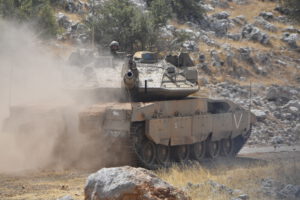A great shock struck an American official who was part of Secretary of State Antony Blinken’s team, which had rushed to Israel. When his colleagues asked him about the situation, he said, “The homeowner has gone insane.”
All expressions of solidarity do not obscure the American guardian’s conclusion that he must play a different role at this moment. America must act as a “father” and not as a “big brother.” Historians, commentators, and veterans of the occupation entity have spoken about a unique moment unlike any they have experienced in 75 years. Calming the madman required letting him scream and rage in place. No one in the world was thinking about discussing Israel’s initial response to what had occurred. Everyone watched Israeli leaders wandering aimlessly in the corridors and halls, hearing military officials call for the killing of any Arab. The few wise individuals conveyed warnings to the Americans and the founders in Europe, asking for assistance and swift intervention, not only to protect Israel from its enemies but also to help it make the right decisions.
On the other hand, Palestinians were experiencing a moment of breaking from all commitments. They expressed in a few hours the state of “the man who was humiliated until his patience ran out.” But his large family quickly helped him calm down a bit, process his big catch, and prepare for the next day. Contrary to the Western hysteria that surpassed the madness of the entity’s own people, the leaders of the resistance axis acted with a cool head. None of them hid their tears of joy at achieving the unimaginable, but none of them were swept away by ecstasy. Most began to think about how to safeguard this achievement and lessen its cost to the people of Palestine.
For 18 days, it can be said that improvisation was the common thread in all reactions of Israel and its allies: programs, goals, and visions were traded like stocks on a market. Chaotic gambles without a basis in solid facts. Meanwhile, the West had no choice but to let “the homeowner” continue his random acts of revenge and unleash an unprecedented frenzy of bloodshed.
The problem is that Israel, along with its allies, cannot find a way to benefit from this madness. There’s nothing that can be presented as a victory for retaliation or deterrence restoration. Chaos ruled Western diplomatic offices. It was reported that a Turkish official said that Egypt, Saudi Arabia, and Jordan detected the extent of American confusion, allowing them to oppose ridiculous proposals meant to appease Israel. The Turkish official did not suggest that the West collapsed like Israel did. He didn’t grant the leaders of Saudi Arabia, Egypt, and Jordan a medal of courage. He meant that everyone felt the depth of confusion in the West’s support for Israel.
The Americans, and their allies, recognize that revenge won’t revert things to their state before October 7. The only option remaining is to consider a ground invasion, hoping it will afford Israel a victory that will bring him down from his high horse.
In two weeks, ideas were proposed that can now be revisited to comprehend the political and military machinations of Israel and its allies. The U.S. began by allowing Israel to retaliate without question. When asked for cooperation, they suggested thinking about a measure that would grant Israel a decisive victory. The idea of relocating the people of Gaza to Sinai was initially dismissed before being reconsidered. Internal displacement was enforced using fire and siege, with a firm position against discussing a ceasefire or introducing humanitarian aid. Israel was equipped with all forms of American support – financial, security, and ample ammunition and military deployments at sea. Everyone started discussing Israel’s right to strike Gaza and eliminate Hamas without any reservations. However, the Americans and their allies recognize that revenge won’t reset the status quo ante of October 7. The only option left is contemplating a ground invasion, hoping it will secure Israel a triumph that will dislodge him from his perch.
Yet, the condition of the Israeli army is distinct from its other institutions. The decline called for a different type of American involvement. The Biden administration set aside its unfavorable opinion of Benjamin Netanyahu and his government, deciding that “the father” would handle this personally. He gathered all his children, gazing at them with a mix of compassion and fury. He plainly informed them that they weren’t in a position to make decisions independently. He urged them to reconfigure the major decision council, incorporated those he trusted into the war council’s core, and scrutinized military leaders closely. No one could challenge him; they were aware that he had intelligence and military briefings from a joint team of the Department of Defense and the CIA, which included members who had taken part in military drills with Israel. This briefing advised the U.S. President that the Israeli army isn’t prepared for a large-scale war and can’t achieve significant victories. This guided Biden to address Israel’s leaders, setting clear boundaries: you will have one more chance to vent your anger on civilians in Gaza without any interference. But act wisely. At the same time, provide me with a list of verifiable objectives, executable strategies, and be ready to address the aftermath’s questions. And bear in mind that the devastation that has transpired can’t be overlooked in any subsequent political approach to the crisis without offering concessions.
This article is translated from the original published in Al Akhbar






